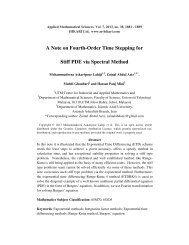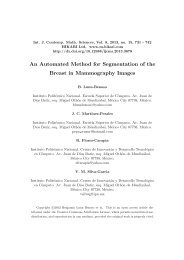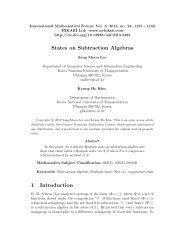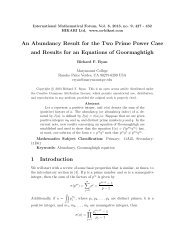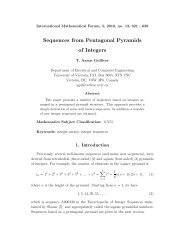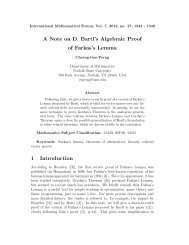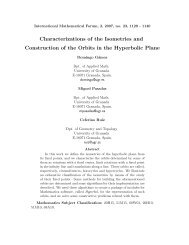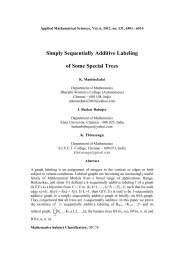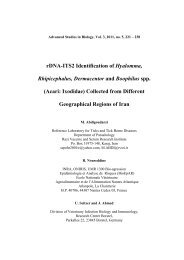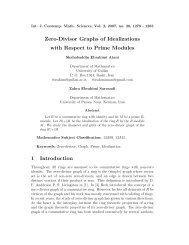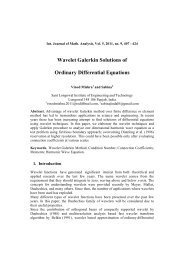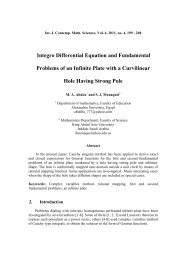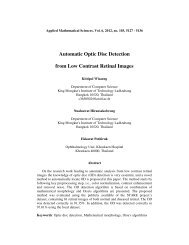With Concern the Difficult Part of the General Berge Last Theorem ...
With Concern the Difficult Part of the General Berge Last Theorem ...
With Concern the Difficult Part of the General Berge Last Theorem ...
You also want an ePaper? Increase the reach of your titles
YUMPU automatically turns print PDFs into web optimized ePapers that Google loves.
<strong>General</strong> <strong>Berge</strong> last <strong>the</strong>orem and <strong>the</strong> Hadwiger conjecture 429<br />
(1) The <strong>Berge</strong> problem is true.<br />
(2) ω(G) =β(G), for every G ∈ Ω. ✷<br />
We recall (see Preliminaries or see Section.1) that <strong>the</strong> Hadwiger conjecture<br />
states that χ(G) ≤ η(G), for every graph G. Using <strong>the</strong> hadwiger index<br />
τ, <strong>the</strong>n <strong>the</strong> following is <strong>the</strong> surgical reformulation <strong>of</strong> <strong>the</strong> Hadwiger conjecture.<br />
<strong>Theorem</strong> 5.2 (see [4] or [6]). (The surgical reformulation <strong>of</strong> <strong>the</strong> Hadwiger<br />
conjecture). The following are equivalent.<br />
(1) The Hadwiger conjecture is true.<br />
(2) ω(G) =τ(G), for every G ∈ Ω. ✷<br />
Visibly, <strong>Theorem</strong> 5.1 and <strong>Theorem</strong> 5.2 are resembling; so resembling that<br />
<strong>the</strong>y seem identical. More presicely, <strong>Theorem</strong> 5.1 and <strong>Theorem</strong> 5.2 clearly say<br />
that <strong>the</strong> <strong>Berge</strong> problem and <strong>the</strong> Hadwiger conjecture are implicitely <strong>the</strong> same<br />
problem. That being so, remarking via [0] or via [8] that <strong>the</strong> <strong>Berge</strong> problem<br />
is true, <strong>the</strong>n, using <strong>Theorem</strong> 5.1 and <strong>Theorem</strong> 5.2, it becomes trivial to deduce<br />
that: if <strong>the</strong> Hadwiger conjecture is true, <strong>the</strong>n <strong>the</strong> <strong>Berge</strong> problem and <strong>the</strong><br />
Hadwiger conjecture were exactly <strong>the</strong> same problems; and this confirm <strong>the</strong> conjecture<br />
stated in [7] that: <strong>the</strong> <strong>Berge</strong> problem and <strong>the</strong> Hadwiger conjecture are<br />
equivalent; and <strong>the</strong>refore, <strong>the</strong> Hadwiger conjecture is only a non obvious special<br />
case <strong>of</strong> <strong>the</strong> general <strong>Berge</strong> last <strong>Theorem</strong>. So, <strong>the</strong> following two conjectures are<br />
natural, reasonable and not surprising.<br />
Conjecture.1: (Tribute to Claude <strong>Berge</strong>). The <strong>Berge</strong> problem and <strong>the</strong> Hadwiger<br />
conjecture are exactly <strong>the</strong> same problem. ✷<br />
Conjecture.2 (Render homage to Claude <strong>Berge</strong>). The Hadwiger conjecture<br />
is only a non-obvious special case <strong>of</strong> <strong>the</strong> general <strong>Berge</strong> last <strong>Theorem</strong>. ✷<br />
References.<br />
[0]. Chudnovsky, Robertson, Seymour and Thomas. The strong perfect graph<br />
<strong>the</strong>orem. Annals <strong>of</strong> Ma<strong>the</strong>matics (2004)<br />
[1] C. <strong>Berge</strong>. Graphs. Third revised edition, North Holland Ma<strong>the</strong>matical<br />
Library 1991.<br />
[2] C. <strong>Berge</strong>. Graphs (Chap. 16). Third revised edition, North Holland Ma<strong>the</strong>matical<br />
Library 1991.<br />
[3] Hadwiger. H. Uber Eine Klassifikation Der Streckenkomplexe, Vierteljschr.<br />
Naturforsch. Ges., Zurich, Vol88. 133 − 142, (1943).<br />
[4] Ikorong Anouk Gilbert Nemron. A Curious Resemblance between <strong>the</strong> difficult<br />
part <strong>of</strong> <strong>the</strong> <strong>Berge</strong> conjecture and <strong>the</strong> Hadwiger conjecture. International<br />
Journal Of Ma<strong>the</strong>matics And Computer Sciences. Vol.1, 2006. No.3, 289−295.



